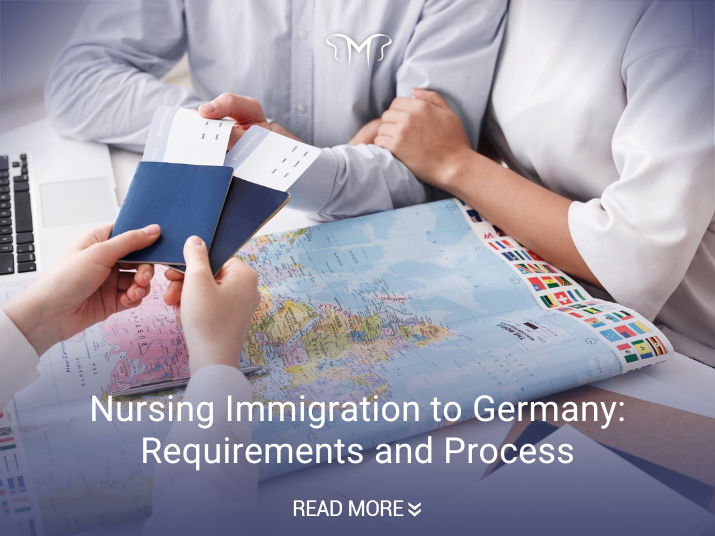
Nursing Immigration to Germany: Requirements and Process
Nursing Immigration to Germany is a promising opportunity for international nurses. Germany values this profession, offering access to social security benefits. At monarchco.de, we provide essential guidance for aspiring nurses. To embark on this journey, you'll need qualifications, a registered nurse license from your home country, German language proficiency, good health, and a clean record.
If you're an international nurse looking to work in Germany, you must have/be:
-
Educational Qualification
-
Your home country's registered nurse license.
-
Good command of the German language
-
Healthy both physically and mentally
-
No criminal record
Learn more about this process and explore the latest content on nursing immigration to Germany, including immigration consultants for nursing professionals and Germany's nursing shortage.
Understanding the Demand: Nursing Shortage in Germany
Germany is grappling with a significant nursing shortage driven by its aging population and rising rates of chronic illnesses. While hiring more specialized nurses might seem like a straightforward solution, there's a crucial scarcity of skilled nursing professionals. This shortage is exacerbated by limited opportunities for qualified nurses from abroad, especially those from countries outside the European Union. Over the next decade, Germany anticipates a shortfall of 200,000 to 300,000 nurses.
To address this issue, German health authorities have been actively recruiting nurses from overseas, often through bilateral agreements. The demand for medical-surgical nurses in German healthcare facilities remains constant due to diverse patient needs and a high prevalence of chronic diseases.
It's essential to address this nursing shortage as it can lead to errors, increased morbidity, and higher mortality rates, particularly in healthcare settings with high patient-to-nurse ratios, where nurses can experience burnout and job dissatisfaction, and patients may face elevated mortality risks.
Visa Requirements for Nurses: Your Path to Germany
Germany is actively seeking international applicants to address the growing demand for nurses in the country. Individuals from all nations have the opportunity to work and live as nurses in Germany. German healthcare facilities, including hospitals and elderly care homes, are actively seeking both male and female nursing professionals.
For EU citizens, the process is straightforward, as they can move to Germany and work in field of nursing without needing a visa. Non-EU citizens, on the other hand, can apply for a German visa once they secure a job or apprenticeship contract. Additionally, there is the option of applying for a job seeker visa if you aspire to work as a nurse in Germany.
There are three primary pathways to becoming a nurse in Germany and getting Visa requirements for nurses in Germany:
-
Nursing Apprenticeship: If you lack prior nursing education, you can embark on a paid nursing apprenticeship in Germany. During this training period, you'll receive a stipend to support your living expenses until you begin earning a regular salary.
-
Recognition of Existing Skills: If you already possess nursing qualifications, you can apply for recognition of your skills in Germany and commence work as a nurse immediately.
-
University Nursing Studies: Another option is to pursue nursing studies at a university in Germany.
International travel nurses aiming to work in Germany must acquire the requisite visa and work permit. Specific requirements vary based on the applicant's country of origin and individual circumstances. It is advisable to seek guidance from the German embassy or consulate in your home country for the most accurate and up-to-date information on nursing immigration to Germany and Visa requirements for nurses in Germany.

Recognizing Your Qualifications: Credential Evaluation
Recognizing your nursing qualifications in Germany is a vital step for international nurses seeking to work in the country. The recognition procedure, also known as "Anerkennung",involves a thorough examination by the competent German authority to determine if your foreign nursing qualifications are equivalent to German standards.
Once you've submitted all required documents, the authority typically reviews them within three to four months. If your foreign nursing qualifications align with German standards, they will be recognized. However, if significant differences are identified, the process varies based on the type of nursing profession:
For non-regulated nursing professions, partial recognition may be granted if some training elements are equivalent while others are not. You'll receive an assessment notice detailing the main differences compared to the German reference occupation. You can often bridge these gaps through refresher training courses and then apply for full recognition.
In regulated nursing professions, the authority will determine adaptation programs to address fundamental differences. Successful completion of the adaptation program confirms equivalence. Additional criteria for profession-specific admission will also be assessed, with the results communicated through an official recognition notice.
For those aiming to work in regulated nursing professions in Germany, equivalent professional qualifications are a requirement. Similarly, if you're from a non-EU country with substantial differences in your nursing qualifications, you can apply for a residence title to pursue recognition. This applies to both regulated and non-regulated nursing professions, enabling you to complete adaptation programs or refresher training courses in Germany.
For more details and guidance on this process, you can explore the "Recognition in Germany" portal and refer to the "Visa for the Recognition of Foreign Qualifications" section for specific information related to your nursing immigration to Germany and the recognition of foreign nursing qualifications.
Mastering the Language: German Proficiency Exams
Mastering the German language is a crucial aspect of nursing immigration to Germany. To embark on a successful nursing career in this country, international applicants must not only meet the necessary professional qualifications but also demonstrate proficiency in the German language.
This linguistic proficiency is assessed through German language exams, which play a pivotal role in the recognition of foreign nursing qualifications and the overall integration into the German healthcare system.
In this guide, we'll delve into the significance of these language proficiency exams, how they factor into the nursing immigration process, and the various examinations and requirements that aspiring nurses need to navigate. Whether you're a seasoned nurse looking to relocate to Germany or a nursing student planning your future, understanding these language exams is a vital step on your journey to a nursing career in Germany.
To help you with this, here's some information and guidance about Mastering the Language: German Proficiency Exams:
Common German Proficiency Exams:
There are several standardized exams to assess your German language proficiency. The most widely recognized ones are:
-
Goethe-Zertifikat: Offered by the Goethe-Institut, these exams are internationally recognized.
-
TestDaF: This is commonly used for academic purposes and is accepted by many German universities.
-
DSH (Deutsche Sprachprüfung für den Hochschulzugang): Required for admission to German universities.
-
Telc: Offers a range of German language exams for various purposes, including general language proficiency and specific job-related exams.
Exam Levels of German Language
These exams are typically divided into different levels, ranging from A1 (beginner) to C2 (proficient). The specific level you should aim for depends on your goals and the requirements of the institution or job you are applying to.
Read more: Immigration with the B1 German language level
Preparation Resources for the German Language Exam
-
Textbooks: Consider using textbooks like "Studio D," "Menschen," or "Aspekte Neu" for structured learning.
-
Online Courses: Platforms like Duolingo, Babbel, and Rosetta Stone offer German courses.
-
Language Schools: Enrolling in a language school or taking courses at a Goethe-Institut can provide structured learning.
-
Tutors: Private tutors or language exchange partners can provide personalized help.
-
Practice Tests: Utilize sample exams and practice tests available online.

Finding Nursing Jobs in Germany: Opportunities and Resources
Finding nursing jobs in Germany offers a range of opportunities and resources for both aspiring and experienced nurses. These opportunities encompass various healthcare settings, ensuring that nurses can explore different specialties and career paths. The primary employers for nurses in Germany include hospitals and clinics, where nurses can gain experience in diverse medical fields such as general medicine, surgery, pediatrics, and intensive care.
Additionally, the growing elderly population has led to increased demand for nursing professionals in nursing homes and assisted living facilities specializing in geriatric care. Rehabilitation centers offer roles in assisting patients through recovery while the field of home healthcare is on the rise, providing personalized care in the comfort of patients' homes. Furthermore, nurses interested in research and academia can contribute to nursing advancements and educate future generations in universities and research institutions across Germany.
This guide explores these job opportunities and resources for nurses pursuing a career in Germany, facilitating their journey into the German healthcare system. Whether you are a nursing student planning your future or a seasoned nurse seeking new horizons, understanding these opportunities is essential for a successful nursing career in Germany.
Germany offers a wide range of nursing opportunities across various healthcare settings. Let's explore some of the sectors where international nurses can find employment in Germany.
1.Hospitals and Clinics
Hospitals and clinics stand as the principal employers of nurses in Germany, offering a myriad of job opportunities in various specialties. These encompass general medicine, surgery, pediatrics, intensive care, and beyond.
Working in hospitals and clinics allows nurses to acquire invaluable experience while being exposed to advanced medical treatments. For nurses seeking diverse and enriching career options, these healthcare facilities are at the forefront of job opportunities in Germany.
2.Nursing Homes and Assisted Living Facilities
Nursing homes and assisted living facilities are experiencing increased demand for skilled nursing professionals in Germany due to the aging population. These settings primarily concentrate on long-term care for elderly individuals, offering abundant opportunities for nurses to specialize in geriatric care. As the need for such services continues to grow, these facilities present promising job opportunities for nurses in Germany.
3.Rehabilitation Centers
Rehabilitation centers hold a crucial role in facilitating the recovery of patients from injuries, surgeries, or illnesses. Nurses employed in rehabilitation centers actively contribute by assisting with physical therapy, managing medications, and delivering personalized care to aid patients in regaining their independence.
With their valuable roles, these centers offer promising job opportunities for nurses in Germany, addressing the growing need for specialized healthcare services.
4.Home Healthcare
Home healthcare services are gaining prominence in Germany, presenting valuable job opportunities for nurses. In this sector, nurses extend medical assistance and support to patients within the comfort of their own homes. This approach ensures that individuals receive personalized care while remaining in a familiar and reassuring environment. As the demand for such services grows, nurses in Germany find a promising array of job opportunities in home healthcare, catering to the needs of diverse patients.
5.Research and Academia
Research and academia provide an exciting avenue for nurses in Germany to explore. Here, nurses passionate about research and education can find compelling job opportunities within universities, research institutions, and healthcare organizations.
In these roles, nurses have the chance to contribute to the evolution of nursing practice, actively participate in research endeavors, and play a pivotal role in educating and shaping future generations of nurses. Germany offers a dynamic environment for nurses interested in research and academia, making it a promising option among the various job opportunities available for nursing professionals in the country.
Nursing Registration in Germany: Licensing and Certification
Nursing registration and licensing in Germany are critical steps for those pursuing a nursing career in the country. Registered Nurses in Germany hold the title of Gesundheits- and Krankenpfleger, previously known as Krankenschwester (female) or Krankenpfleger (male). To ensure a successful nursing career, it's vital to choose an accredited program recognized by German nursing authorities.
The licensing process varies by state, so understanding your desired state's requirements is crucial. It typically involves passing a comprehensive state examination evaluating both theoretical knowledge and practical skills. This examination comprises written and oral/practical components. Thorough preparation, including studying the nursing curriculum and honing clinical skills, is essential.
Upon passing the state examination, you can apply for nursing registration, permitting legal practice in Germany. The registration process involves submitting documentation of your education, examination results, and language proficiency, along with any necessary fees. It may also entail a criminal background check.
It's crucial to adhere to guidelines and deadlines provided by nursing authorities. Once approved, you'll receive your nursing registration, allowing you to commence your nursing career in Germany. Note that nursing registration requires periodic renewal, necessitating ongoing compliance with renewal criteria to maintain your registration's validity.
Salaries and Benefits: What to Expect as a Nurse in Germany
Nursing in Germany is not just a job; it's a fulfilling career with rich opportunities and rewards. Nurses play a pivotal role in improving the lives of people from all walks of life, focusing on patient care at its core. It's a profession that allows you to save lives, bring happiness to individuals and their families, and provide solace to those in need. The nursing landscape in Germany offers a multitude of specializations, from mental health and elderly care to rehabilitation and midwifery, ensuring you can make a meaningful difference.
When it comes to remuneration, nurse salaries in Germany are predominantly determined by the employer. If your employment is based on a collective agreement in the public sector, the average nurse's salary in Germany hovers around €33,000 per year. Monthly salaries typically range from €2,800 to €2,900 on average. The highest nurse salary reaches €4,620, while the lowest is around €1,340.
Moreover, nurse's salary vary by location within Germany. For instance, in 2023, the average registered nurse salary in Berlin is approximately €33,896 per year. In other German areas, average annual salaries include €30,000 in Frankfurt, €36,500 in Frankfurt am Main, €30,588 in Hamburg, and €38,000 in Stuttgart. These figures reflect the competitive and rewarding nature of nursing careers in Germany.
Professional Growth: Training and Development for Nurses
Nursing in Germany places a strong emphasis on continuous professional development, offering nurses abundant opportunities for training and career advancement. The healthcare system recognizes that ongoing education and skill enhancement are vital for delivering top-tier patient care. Several key aspects highlight the professional growth of nurses in Germany:
-
Specialization and Certification: Nurses can opt to specialize in various fields like intensive care, anesthesia, oncology, or pediatrics. This often involves completing additional training and obtaining certifications, which not only enhance their skills but also open doors to higher positions and salaries.
-
Continuous Education: Germany encourages nurses to engage in lifelong learning. Many healthcare institutions offer in-house training, workshops, and seminars. Nurses can also pursue advanced degrees like Bachelor of Science in Nursing (B.Sc.N) or Master of Nursing (M.Sc.N) to further their careers.
-
Language Proficiency: Proficiency in language is crucial for patient care, especially when working in international healthcare settings or with non-German-speaking patients. Language courses and certifications are readily available.
-
Leadership and Management: Nurses with aspirations for leadership roles can benefit from management and leadership training programs. These equip nurses with the skills necessary to lead teams, manage resources, and make crucial decisions in healthcare settings.
-
Research and Innovation: Germany actively promotes nursing research and innovation. Nurses interested in research can access resources and funding to conduct studies, contribute to evidence-based practices, and drive improvements in patient care.
-
Mentorship and Preceptorship: Experienced nurses often serve as mentors or preceptors for newer colleagues, providing invaluable guidance and support to those new to the profession or specific clinical areas.
-
Professional Associations: Joining nursing associations and organizations can be highly advantageous. These groups offer networking opportunities, access to the latest research, and resources for ongoing professional development.
-
International Opportunities: Germany's healthcare system encourages international exchanges and collaborations. Nurses may have the opportunity to participate in international conferences, projects, or work experiences, broadening their horizons and enriching their careers.
In summary, nurses in Germany have access to a robust framework for professional growth. The emphasis on continuous learning, specialization, and skill development ensures that nurses can provide exceptional care and progress in their careers. Whether you're starting your nursing journey or a seasoned professional, Germany provides a supportive environment for ongoing development in the nursing profession.
Seeking Guidance: Immigration Consultants for Nurses
The process of Nursing Immigration to Germany can be overwhelming and complicated. There are a number of steps to follow and a lot of paperwork to complete. Working with an immigration consultant can ease the process for applicants and help them avoid costly mistakes.
Immigration consultants like Monarchco have the experience and knowledge to guide applicants through the entire process, from start to finish. They can help applicants gather the required documentation, complete the application forms, and prepare for the interview. Immigration consultants can also provide advice on how to increase their chances of success.
Some immigration agencies, such as Monarch, offer special deals and offers to nurses, such as immigration services free of charge. These offers can save applicants a significant amount of money. This is a suitable position for people who are looking for Nursing Immigration to Germany.
If you are considering Nursing Immigration to Germany, it is important to seek guidance from a qualified immigration consultant. A consultant can help you make the process easier and more efficient.
Here are some specific benefits of working with an immigration consultant for nursing immigration to Germany:
-
Save time and money: Immigration consultants can help you avoid costly mistakes and delays by ensuring that your application is complete and accurate.
-
Increase your chances of success: Immigration consultants have the experience and knowledge to help you increase your chances of success in the immigration process.
-
Get personalized advice: Immigration consultants can provide you with personalized advice based on your specific circumstances.
-
Peace of mind: Knowing that you have a qualified professional helping you through the process can give you peace of mind and allow you to focus on other aspects of your preparation.
If you are interested in working with an immigration consultant for nursing immigration to Germany, be sure to do your research and choose a reputable agency. You should also make sure that the consultant is licensed and has experience helping nurses immigrate to Germany.


